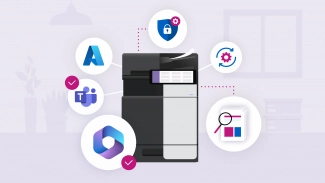Názor k článku Použití instrukcí SSE a AVX pro zrychlení bitových operací od Kevil - Pěkný článek. Pro daný účel bych zkusil výpočet...
-
Článek je starý, nové názory již nelze přidávat.
-

Pěkný článek. Pro daný účel bych zkusil výpočet na GPU ;-). Rád programuji v C++, x64 asm a AVX2.
Aktuálně se pokouším naprogramovat prolomení WiFi hesla o délce 8 znaků (malá/velká písmena a číslice) hrubou silou, což je 62^8 tj. cca 200 bilionů kombinací. Zkušebně v C++ CUDA programu (Visual Studio 2022) všechna hesla vygeneruji za cca 40 ms (notebook má NVIDIA GeForce GTX 960M). Umím už v C++ spočítat SHA-1 a chystám se doplnit HMAC a PBKDF2, abych našel správné heslo v rozumném čase.
#include "cuda_runtime.h" #include "device_launch_parameters.h" #include <stdio.h> #include <iostream> #include <chrono> using namespace std; using namespace std::chrono; # define blocks 4 # define threads 992 # define characters 8 cudaError_t cudaStatus; // "abcdefghijklmnopqrstuvwxyzABCDEFGHIJKLMNOPQRSTUVWXYZ0123456789" __constant__ char1 charset[] = { 0x61, 0x62, 0x63, 0x64, 0x65, 0x66, 0x67, 0x68, 0x69, 0x6a, 0x6b, 0x6c, 0x6d, 0x6e, 0x6f, 0x70, 0x71, 0x72, 0x73, 0x74, 0x75, 0x76, 0x77, 0x78, 0x79, 0x7a, 0x41, 0x42, 0x43, 0x44, 0x45, 0x46, 0x47, 0x48, 0x49, 0x4a, 0x4b, 0x4c, 0x4d, 0x4e, 0x4f, 0x50, 0x51, 0x52, 0x53, 0x54, 0x55, 0x56, 0x57, 0x58, 0x59, 0x5a, 0x30, 0x31, 0x32, 0x33, 0x34, 0x35, 0x36, 0x37, 0x38, 0x39 }; __global__ void blackcat(void) { char1 password[characters]; uint8_t counters[characters]; uint64_t n = (pow(62, characters) / threads); // Number of search cycles per thread // Nastavení počátečních hodnot hesla pro každé vlákno, odkud se mají začít generovat for (int i = characters - 1; i >= 0; i--) { counters[i] = (n * threadIdx.x / (uint64_t)pow(62, characters - 1 - i) % 62); } while (n > 0) { bool flag = false; for (int i = characters - 1; i >= 0; i--) { password[i] = charset[counters[i]]; if (i == characters - 1) { counters[i]++; if (counters[i] > 61) { counters[i] = (uint8_t)0; flag = true; } } else { if (flag) { counters[i]++; if (counters[i] > 61) { counters[i] = (uint8_t)0; } else { flag = false; } } } } // Po odkomentování vypíše poslední 3 generované hesla //if (threadIdx.x == threads - 1 && blockIdx.x == blocks - 1 && n < 4) { // printf("Thread[%d]",threadIdx.x); // for (int i = 0; i < characters; i++) { // printf(" %c", password[i]); // } // printf("\n"); //} /* Test zda jsme našli password, pokud ano vypíšeme password, ukončíme všechna vlákna a předčasně se vrátíme z funkce, možná bude dobré občas vypsat čas běhu, abychom věděli, že program stále běží */ n--; } } int main() { auto start = high_resolution_clock::now(); cudaSetDevice(0); cudaStatus = cudaGetLastError(); if (cudaStatus != cudaSuccess) { fprintf(stderr, "cudaSetDevice failed! Do you have a CUDA-capable GPU installed?"); } blackcat << <blocks, threads >> > (); cudaStatus = cudaGetLastError(); if (cudaStatus != cudaSuccess) { fprintf(stderr, "Kernel launch failed: %s\n", cudaGetErrorString(cudaStatus)); } cudaDeviceSynchronize(); cudaStatus = cudaGetLastError(); if (cudaStatus != cudaSuccess) { fprintf(stderr, "cudaDeviceSynchronize returned error code %d after launching addKernel!\n", cudaStatus); } auto stop = high_resolution_clock::now(); auto duration = duration_cast<microseconds>(stop - start); printf("\nTime = %llx (HEX)\n", duration.count()); return 0; }






















